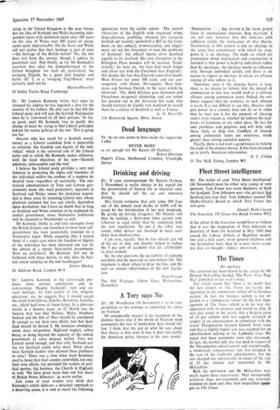Sir: Mr Ludovic Kennedy writes that since he changed his
address he has regained a love for the country of his fathers. He also says he has left the Liberal party and will join the Scottish Nationalists once he is 'convinced of all their policies.' So far, so good, until Mr Kennedy tries to justify this change of heart by trying to find Liberal principles behind the native policies of the SNP. This is going too far.
Anyone who has stood for a Scottish consti- tuency as a Liberal candidate finds it impossible to correlate 'the freedom and dignity of the indi- vidual,' which is the universal aim of the Liberal party and to which Mr Kennedy makes reference, with the local objectives of the st4P—'Scottish admirals, ambassadors and the rest.'
I believe the Liberal party provides a very real function in protecting the rights and freedoms of the individual within the confines of a modern in- dustrial state—regardless of nationality. The cen- tralised administration of Tory and Labour gov- ernments made this need particularly apparent in Scotland and Wales, where the electorate respon- ded in these areas by returning Liberal MPS, whose platform included but was not wholly dependent upon devolution; but I have no doubt that so long as Scotland and Wales continue to be neglected by central government, more Nationalist politicians will be returned to Westminster as well.
Mr Kennedy thinks so and cites examples from the British Empire and elsewhere to show how self- government has been successfully attained on a Nationalist ticket. While accepting this, I cannot think of a single case where the freedom or dignity of the individual has been enhanced one iota by the advent of a purely Nationalist government. Now an ex-Liberal, Mr Kennedy will not be bothered with these details; so why does he hesi- tate about jumping on the SNP bandwagon?


































 Previous page
Previous page